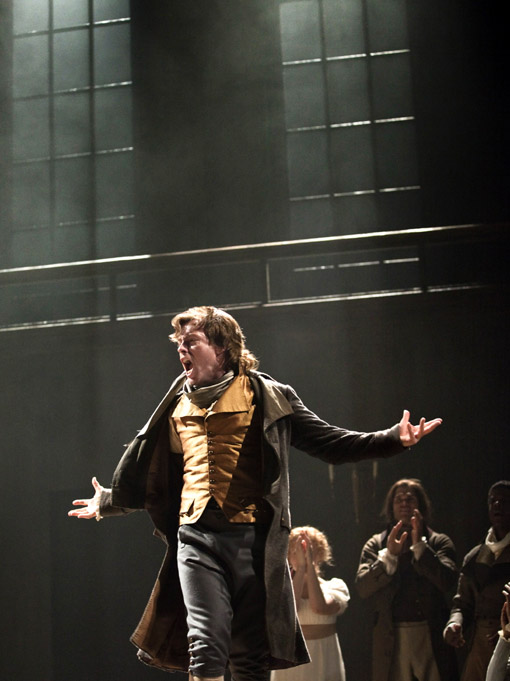Danton’s Death by Georg Buchner
in a new version by Howard Brenton
at the National Theatre (Olivier Theatre) London South Bank
until October 14, Tickets from £10
IF YOU get the chance to go to the theatre this summer, then here’s a play to go and see.
‘Danton’s Death’, written by Georg Buchner – a 21-year-old German revolutionary who was facing arrest as he penned this masterpiece in secrecy – has been adapted for today’s stage by Howard Brenton and can be seen at the National Theatre until the end of October.
Brenton and the director Michael Grandage should be congratulated for this mesmerising production that almost tempts you to leap up onto the stage and join in the action!
A weary Danton, played by the outstanding Toby Stephens, suddenly springs to life when faced with the death sentence of the guillotine, passionately defending his record in the overthrow of the monarchy and the defence of the revolution.
Popular unrest at his arrest threatens to topple the ‘incorruptible’ Robespierre, who up until this point in the revolution has been Danton’s comrade in arms, co-leaders of the Jacobins who have assumed power.
Revolution divides Danton and Robespierre, as the Jacobins divide into different factions, before Robespierre himself is put to death as the revolution reaches its zenith and ‘Thermidor’ triumphs, supplanting the regime of the Committee of Public Safety with the regime of the Directory.
The play deals with the period before Thermidor, from March 25-April 5, 1794, following the defeat of the anti-Republican forces in the Vendee and the execution of Hebert.
This production brilliantly reflects the speed and intensity with which it was penned and of the French Revolution itself and its constantly shifting scenes.
Defending the ‘Terror’, Robespierre (Elliot Levey) tells the Jacobins: ‘People say that terror is the weapon of tyranny, and that our government therefore resembles a tyranny. Of course it does.
‘But only in as much as the sword in the hand of a fighter for freedom resembles the sword of a slave, fighting for a king.
‘The despot rules his bestial serf through terror. As a despot he has that right.
‘You are the founders of the Republic. You have the right to use terror to crush the enemies of liberty.
‘The revolutionary government is the despotism of liberty against tyranny.’
Saint-Just, Robespierre’s right-hand man (Alec Newman), tells the National Convention: ‘The physical world would take centuries to do what we have done, punctuated by generations.
‘We took four years. Is it, then, so surprising that at every turn of the tide the great sea of the revolution washes up its corpses?’
Defending himself, Danton responds: ‘There they are, the murdering cowards, look at the ravens of the Committee of Public Safety.
‘I acccuse Robespierre, Saint-Just and their executioners of high treason.
‘They want to choke the Republic in blood. The ruts made in the tumbrils are the highways on which foreign armies will flood the heart of France.
‘For how long must the footprints of liberty be graves?
‘You want bread, they throw you heads. You are thirsty, they make you lick the steps of the guillotine.’
(Robespierre’s Committee of Public Safety had been established for less than one year and Danton had been its first president).
Buchner knew the speeches of the revolutionary leaders by heart.
This adaptation of his work begins in darkness with a roll of thunder, a portent of the great drama about to unfold.
The work is a great exposition of the transformation of opposites that takes place within the revolution.
Toby Stephens plays Danton with a posh English accent, but once the drama gets going he seems made for the role.
Facing the Revolutionary Tribunal he declares: ‘Bravado is no doubt, a fault. But that national bravado, the bravado of defiance with which I fought for liberty, that is the greatest of all virtues.
‘I invoke that sense of daring, that defiance now, in the name of the Republic and against my accusers.’
The play ends with the guillotining of Danton and his co-defendants, including Camille Desmoulins (Barnaby Kay), once Robespierre’s close friend.
Robespierre’s death came only months later.
His Jacobins represented the revolutionary masses of Paris, but, although they were overthrown, the revolution had already achieved its main tasks.
It was not a socialist revolution, but a revolution to do away with the system of feudal landlords and the rule of the absolute monarchy, which had reduced most of France to starvation.
Leon Trotsky, co-leader of the Russian Revolution with Lenin, wrote: ‘The social overturn of 1789 to 1793 was bourgeois in character. In essence it reduced itself to the replacement of fixed feudal property by “free’’ bourgeois property.’ (From ‘The Workers’ State and The Question of Thermidor and Bonapartism’).
The Marxist Franz Mehring in his book ‘Absolutism and Revolution in Germany’, wrote: ‘Even if the sans-culottes, so called because of their proletarian dress, or the Jacobins, as they were named after their most powerful organisation, were not modern socialists, they were indeed true revolutionaries.
‘They annihilated all the counter-revolutionary assaults of the court and of the feudal estates and saved France when the European powers carried war into the country to strangle the revolution.’
